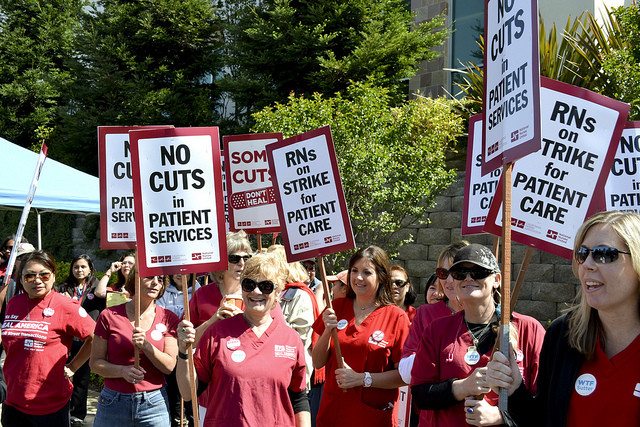Labor & Economy
Nurses at Eight California Hospitals Strike to Demand Adequate Staffing

More than 5,000 registered nurses belonging to the California Nurses Association (CNA) are striking today at eight California hospitals, with a somewhat smaller number continuing the strikes Friday. The nurses are demanding that hospitals provide adequate staffing levels which are now, they claim, endangering patients. (Disclosure: CNA is a financial supporter of Capital & Main.)
Hospitals affected by the strike are: Los Angeles Medical Center (Kaiser Permanente); Providence Little Company of Mary Medical Center Torrance; Providence Saint John’s Health Center; Mills-Peninsula Health Services (Sutter); Sutter Auburn Faith Hospital; Sutter Roseville Medical Center; Sutter Santa Rosa Regional Hospital and Sutter Tracy Community Hospital.
Sue Robbins, a registered nurse who has worked at Sutter Roseville Medical Center for 14 years, says this is her first strike and it’s also the first time a strike has taken place at her hospital, located north of Sacramento.
Robbins says that a rehab center that served the community is gone and that Sutter’s management wants to eliminate “baby nurses” — specialists who attend to infants after they are born. It’s ironic, she adds, that management is seeking to change the terms of nurses’ health coverage, which may put a sizable strain on her colleagues, many of whom are single moms.
Robbins, who sits at the bargaining table, says the profitable hospital chain cannot justify the cuts it is making or plans to make.
“The only thing they’ve told us is that health care costs are rising, and we’re like, ‘Yeah, you’re raising them.’”
According to a prepared statement sent out Wednesday by Sutter Health, a nurse who chooses to work full-time at Sutter Health hospitals with CNA contracts earns an average of $140,000 per year (or more than $65 per hour). They also have the option of zero-monthly premium health insurance, or extremely low-cost benefits.
“Reaching agreement requires reasonable proposals on both sides,” Sutter spokesperson Bill Gleeson said in the statement. “The union has asked for wage increases of up to 19 percent, and at many of our hospitals, the union has yet to even respond to proposals we presented back in December.”
Robbins disputes the claim of wages for nurses being high. “We have 900 nurses and we still haven’t found that nurse who makes that much money,” she says, adding that many will be waving their W-2’s during the strike today as proof.
Contracts with the nurses are in various stages of the bargaining process. Some have expired or have been extended.
Chuck Idelson, communications director for National Nurses United, said that Kaiser Los Angeles Medical Center RNs are protesting chronic short staffing at their hospital. At the Sutter hospitals, nurses also cite persistent short staffing that puts patients at risk. Sutter is also demanding 130 reductions in health coverage for RNs and their families that would mean substantive increases in out-of-pocket costs for ER care, lab work, diagnostic procedures and other care.
“Sutter is a poster child with everything that is wrong with corporate medicine,” Idelson said.
According to a recent survey that was published by the Sacramento Business Journal this week, Pat Fry of Sutter Health hospitals ranks number one among the 25 highest paid chief executives of Sacramento-area nonprofit health organizations. Tax records show his total compensation for 2013 was $6,010,188. Two other Sutter hospital executives ranked third and fourth in the same survey.
Tessie Costales, an intensive care unit nurse who has worked at Kaiser Los Angeles Medical Center in Hollywood for 29 years, was on the picket line at 7 a.m. Thursday with a handmade sign. Using colored markers, she had written on one side: “As a nurse, I guarantee safe, patient care and quality patient care.” On the other side: “I love my patients!”
The last time she picketed at her hospital was two years ago. She says the issues are the same today as then, but that now they are intensifying. The new health care reform law, she says, has brought in an influx of patients to Kaiser and staffing is grossly inadequate to care for their needs.
“We have people who are very sick and they have to wait for hours, sometimes even days,” Costales says. “We need more nurses to take care of all those patients. We need more training and management has to commit to recruiting more nurses. Sometimes there is no one to cover [for] us for breaks and we work 12 hours. We are not able to go on break. That is very unsafe – unsafe for patients and for us as health care workers.”
The hospital is important to Costales for personal reasons. Not only does she work there but that is where she, her children and her husband receive their care.
“We expect Kaiser to correct these issues immediately,” she says, “and have a permanent plan on how they would address all of our concerns.”
-

 Latest NewsApril 10, 2024
Latest NewsApril 10, 2024The Transatlantic Battle to Stop Methane Gas Exports From South Texas
-

 Latest NewsApril 23, 2024
Latest NewsApril 23, 2024A Whole-Person Approach to Combating Homelessness
-

 Latest NewsMarch 27, 2024
Latest NewsMarch 27, 2024Street Artists Say Graffiti on Abandoned L.A. High-Rises Is Disruptive, Divisive Art
-

 State of InequalityApril 11, 2024
State of InequalityApril 11, 2024Dispelling the Stereotypes About California’s Low-Wage Workers
-

 Latest NewsApril 24, 2024
Latest NewsApril 24, 2024An Author Reflects on the Effort to Rebuild L.A. After the ‘Violent Spring’ of 1992
-

 State of InequalityMarch 28, 2024
State of InequalityMarch 28, 2024Los Angeles Hotel Workers Could Use the 2028 Olympics to Their Advantage
-

 Striking BackApril 12, 2024
Striking BackApril 12, 2024Organizing the Slopes
-

 Feet to the FireMarch 29, 2024
Feet to the FireMarch 29, 2024New Mexico Governor Vetoes Tax Break for Wells After Pushback




















